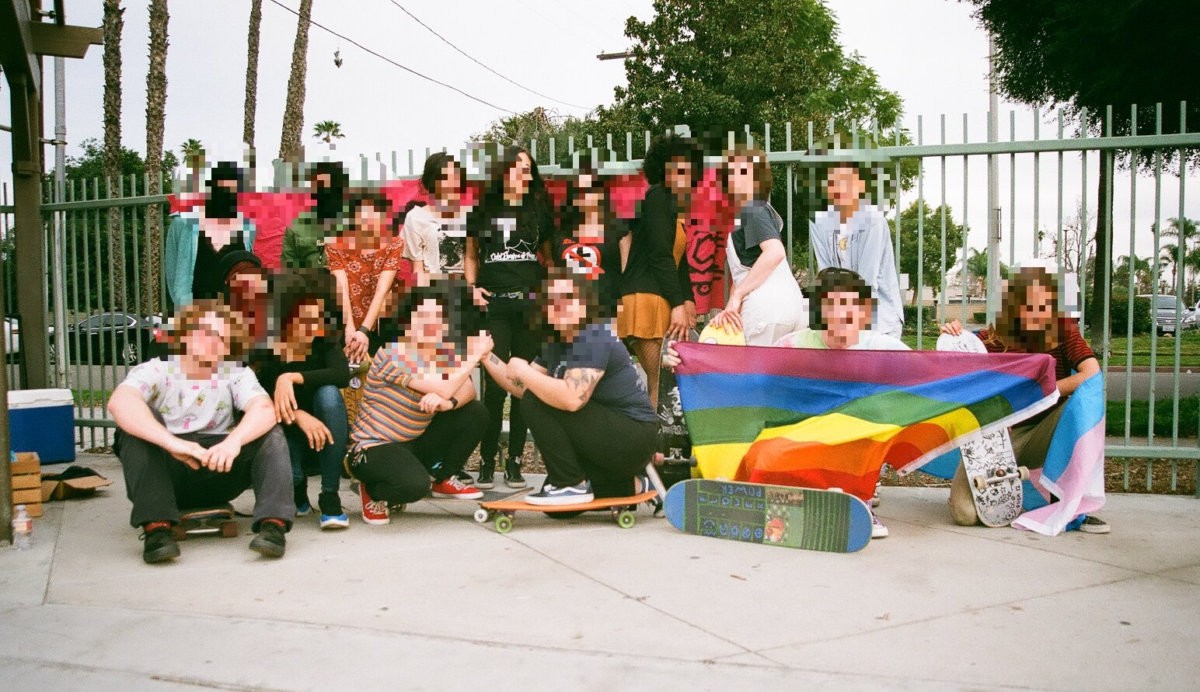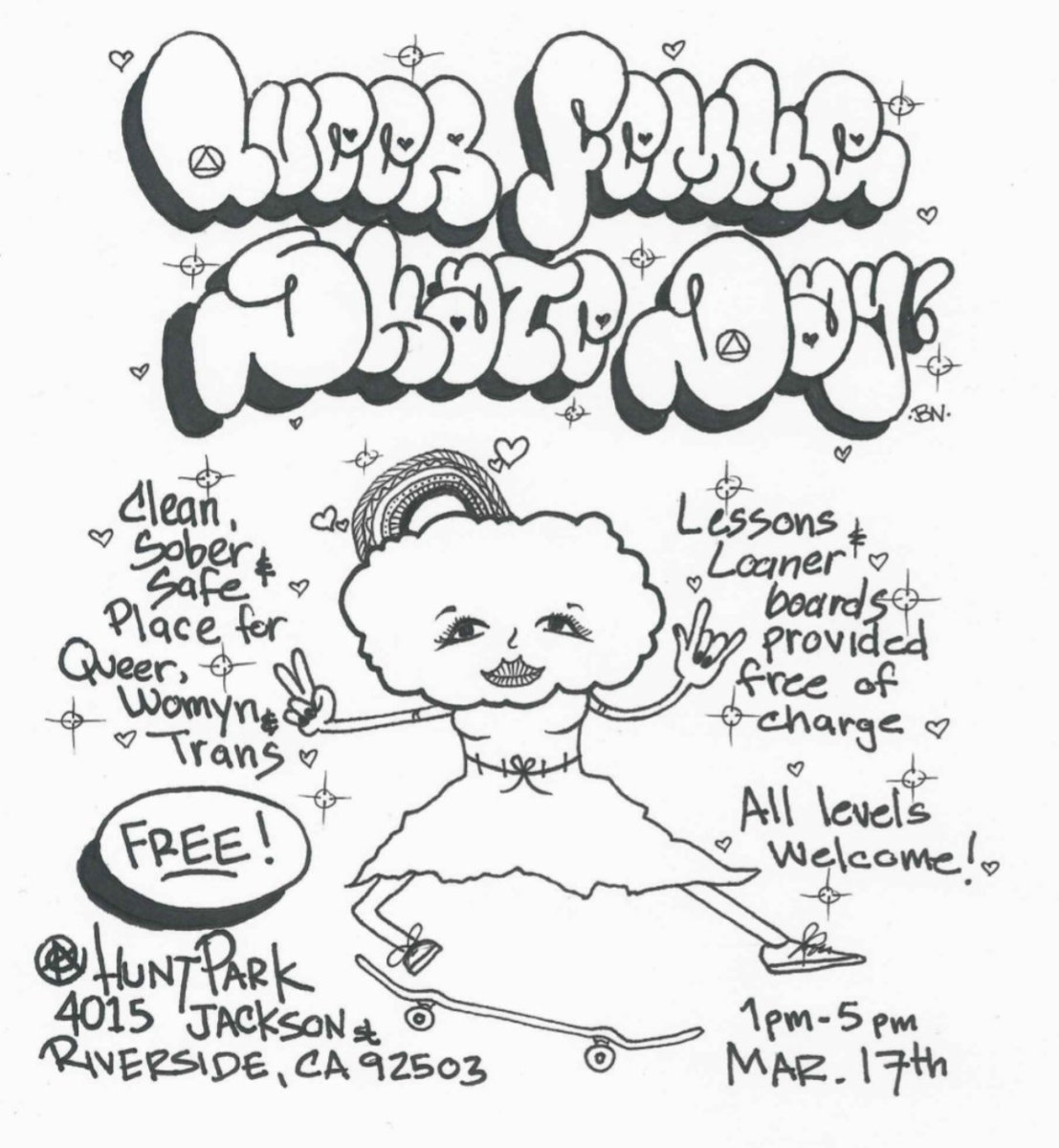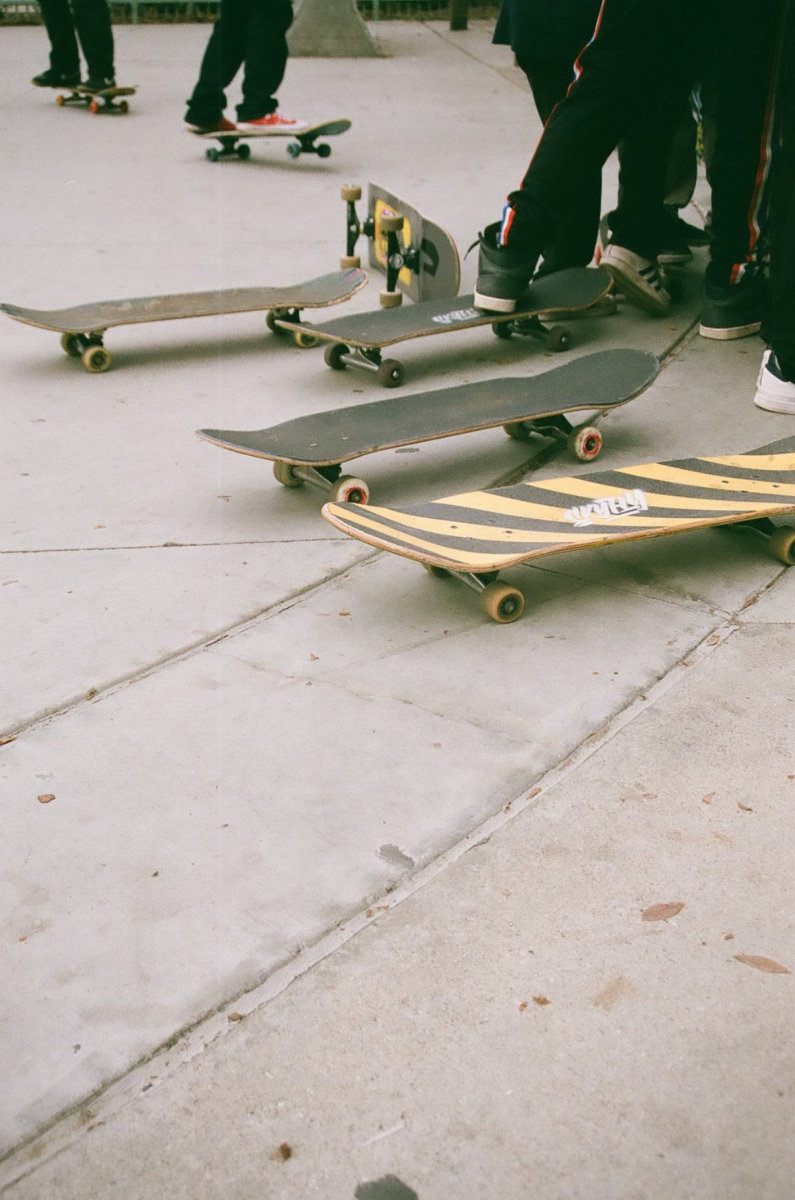Filed under: Anti-Patriarchy, Featured, Queer, Sports, Tranarchy, Trans

Anarchists in the Cactus Collective are building inclusive space for queer, trans, and femme people in the local skating scene of Riverside, California, while also promoting anarchist and antifascist ideas through zines, stickers, and posters. Evelyn from Tranarchy was able to catch up with them to find out just how this social experiment was unfolding.
The congregation of LGBTQ people is of massive importance to our safety and social comfort; unfortunately, queer spaces have had a bad rap due to their vibes of superficiality, alcohol-centeredness, and behind-closed-doors hiddenness. But the radical Riverside-based group known as the Cactus Collective offer a starkly different organizing atmosphere – one that won’t be polite with fascists, radicalizes their community, prioritizes open assembly, includes sober folks, and digs skateboarding.
Since November, the Cactus Collective has held regular Queer & Femme Skate Day events at Hunt Park in Riverside, and when I spoke with them, they expressed immense joy at the attendance they were able to garner.
 “Our first one was in November of last year…I was surprised by how many people turned out, as we don’t have a super large social media presence. We put some fliers up, and just kind of hoped for the best, and people actually responded.”
“Our first one was in November of last year…I was surprised by how many people turned out, as we don’t have a super large social media presence. We put some fliers up, and just kind of hoped for the best, and people actually responded.”
The group was inspired to try out this event for a plethora of reasons, one of which was the notable lack of drug-free, alcohol-free environments for queer folks. “I was born and raised in Riverside, and there’s nothing really here for us except for bars,” one member explained. “It’s really bad for people who have substance abuse issues, and it’s really bad for anybody under the age of 21. That leaves out a ton of people.” Given the apparent lack of sober-friendly LGBTQ spaces, it’s quite refreshing that at their first Skate Day, the group held a first aid training which included instructions on using Naloxone (aka Narcan) to treat overdoses.
“I think now, we have a good relationship with the harm reduction crew here, so I think we’re gonna start making that regular, like every single time we’re gonna distribute Narcan and do those trainings.”
When radical groups help out the local community in this way, it provides a challenge to those who would attack their organizational efforts. Aside from these trainings, the Collective has also distributed food, water, and other supplies to their city’s residents.
That said, given that this group is made up of anti-fascist queer anarchists, not everyone has been so accepting.
 “Skateparks are not usually the most welcoming place for queer people – it’s a very heavily-masculine atmosphere and that’s something we experienced while we were holding the event. We would have people come up to us and act with hostility, because we weren’t conforming to their expectation for a masculine place.”
“Skateparks are not usually the most welcoming place for queer people – it’s a very heavily-masculine atmosphere and that’s something we experienced while we were holding the event. We would have people come up to us and act with hostility, because we weren’t conforming to their expectation for a masculine place.”
Thankfully, efforts to hinder their message have been unsuccessful. As a matter of fact, the skatepark atmosphere offers an opportunity to deprogram the cisnormative and heteronormative ideas that young skaters have been fed.
Our store is re-stocked and re-organized! Brand new sticker packs, a brand new shirt design, new zine packs, and also special bulk deals. All shirts are also organized by size to make it much easier to order, including all older designs. Check it out! https://t.co/0Hks1B7lta pic.twitter.com/CdUzNTHq8x
— It's Going Down (@IGD_News) March 16, 2019
“There’s a lot of young children who go to the skate park who haven’t necessarily developed homophobia or transphobia…They don’t make fun of what it says on [our] stickers even though they are very proudly queer stickers…I hope that we’re helping to develop in their mind an experience with queer people that is outside the narrative that cis-centered and straight-centered media would normally give them.”
When I broached the subject of violence against Riverside’s trans and queer community, one member described the incident of queer resident Jeffrey Owens’ tragic killing in 2002. “There was a case in the 2000s, at the only gay bar in the downtown area, the Menagerie – there was a stabbing in the parking lot in the back of that building,” they responded. “The situation was that somebody exited the Menagerie, and a person or a group of people who were in a car, or in the back of a truck, started yelling homophobic slurs. And the person wasn’t gonna have it, so they went over and got into a verbal argument, and it ended up with the person who left the Menagerie being stabbed, and that person later died in the hospital. The narrative after that – with the people who were around, and who knew about it, and who were there – there’s been this prevailing attitude of ‘let’s keep to ourselves, let’s not make any trouble, lets not stir the pot or rock the boat’, and I think that’s bullshit. I hate that mindset, and that’s one of things I want to try to instill in people…we don’t have to be confined to one gay bar, we don’t have to be confined to our houses. If we want to go out in public and be ourselves, we should absolutely have the right to do that, and to defend ourselves.”
In terms of how to defend themselves, the group expressed that they emphasize education on the symbols that encourage transphobic and queerphobic violence, as well as the organizations and people which are likely to put the community in harm’s way.
This is another area in which the Cactus Collective is setting a stellar example for other radical queer groups. An anti-fascist knowledge base is absolutely crucial to radical self-defense training; recognizing the dangerous significance of items like Thin Blue Line flags, or clear affiliations with far-Right groups, is something that increases safety.
 Further, according to the Collective, these conversations can eventually lead to physical self-defense training being offered – given the lack of protection which the police offer queer and trans people, this is of grave importance everywhere.
Further, according to the Collective, these conversations can eventually lead to physical self-defense training being offered – given the lack of protection which the police offer queer and trans people, this is of grave importance everywhere.
“One thing I’ve noticed and enjoyed a lot about the space we’ve created is that there’s a lot of transfeminine people showing up. A lot of the time, it can be rare to have transfeminine people show up to a place in public; most of the time, transfeminine people congregate more online, largely just for safety reasons. So I think it’s just really cool that transfeminine people can be in public, and be themselves, and be around other transfeminine people.”
If this interests you, be sure to check out the group on Twitter, at @NoNaziRiverside, where you can learn about their zines and events. And if you have a few bucks to spare, consider supporting radical LGBTQ organizing by donating to @cactus_collective on Venmo!





